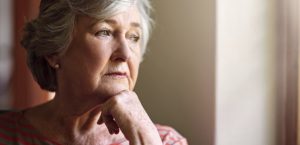Depression Among Elders and What to Do

Do you feel hopeless, distressed and tired all the time?
Are you not interested in activities and social life anymore?
Do you feel trouble sleeping, functioning and eating?
If you have been feeling such things for a time, chances are you may be experiencing depression.
Depression is a common mental health disorder among the elders in the USA. As they age, they have to go through a lot of changes—the death of a spouse, stressful life events, not having someone, and aggravating health problems. The symptoms of elderly depression can affect every aspect of life, from energy, appetite, interest in work, relationships and sleep.
Sadly, not all depressed elders are able to identify the signs of depression or don’t seek the help they require.
Here we have rounded up some bewildering facts about elderly depression.
- Over 34 million Americans age 65 or above have some form of depression. [source]
- Signs of elderly depression can be triggered by other elderly diseases like Alzheimer’s disease, Parkinson’s disease, heart disease, arthritis and cancer. [source]
- One-third of widows/widowers are prone to depression in the first month after the demise of their spouse. Half of them may remain clinically depressed even for a long time. [source]
- Aged patients of depression generally have to pay 50% higher healthcare costs than their non-depressed counterparts. [source]
- Depression is a common reason of suicide among older adults. [source]
- Suicide among while males aged 85 and more is nearly six times the suicide rate in the nation. [source]
- Over 50% older adults get treatment for mental health from primary care physicians. Only 3% aged 65 or above opt for the mental health professionals. [source]
- However, primary care physicians are not optimal to recognize and treat the symptoms of depression in the elders. [source]
- Clinical depression is curable, as over 80% of all people with depression can be successful treated with medication, consultations or both. [source]
- The Mental Health America Survey found that over 60% of adults aged 65 and over know little or almost nothing about depression. [source]
- Only 38% of aged adults consider depression a “health problem”. [source]
- Nearly 58% of elders believe that depression is inevitable as people grow older. [source]
Luckily, Depression is TREATABLE
Yeah, it’s true that depression is treatable in aged adults. Getting the right treatment may improve health and quality of life for elders. The right treatment may help you see improvements as early as two weeks from the start of your treatment. However, it may take several weeks before you feel a complete improvement.
If you are in doubt, make sure to talk to your doctor or health care provider. A doctor will assess your medical history and order a physical exam to see if it is really depression or other another condition that may be triggering your depression symptoms. For example, it is not easy to tell the difference between dementia and depression due to the very similar symptoms.
You may be asked a series of questions about your wellness. Therefore, be open and honest about your symptoms, even if you are not feeling comfortable (after all, you are talking to a doctor.)
If it is depression, your doctor will refer you to a mental health professionals like psychologist, counselor or psychiatrist. The treatment options for depression include medication and psychotherapy. However, the treatment plan can be customized according to your condition.
Apart from getting treatment, there are several ways to manage your symptoms. For example, you can engage with people, do light workouts, eat the right food and improve your sleep.